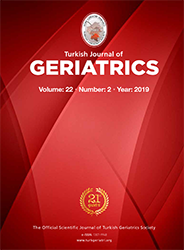2Hitit University, Erol Olçok Training and Research Hospital, Department of Critical Care, Çorum, Turkey DOI : 10.31086/tjgeri.2019.90 Introduction: In intensive care units, numerous geriatric patients are mechanically ventilated, and those with prolonged mechanical ventilation show high mortality. Such geriatric patients may greatly benefit from tracheotomy because it facilitates pulmonary care, increases patient comfort and helps wean them off mechanical ventilation.
Materials and Method: A total of 70 mechanically ventilated geriatric patients were includ-ed. Patients" electronic data, file records, age, sex, mechanical ventilation requirement, Acute Physiology and Chronic Health Evaluation II score, intubation and intensive care unit stay durations, discharge status and complications were examined.
Results: The mean patient age was 78.6¬Ī7.4 years, and the mean Acute Physiology and Chronic Health Evaluation II score was 27.0¬Ī5.9. Tracheotomy was performed after a mean duration of 34.8¬Ī17 days, and the mean intensive care unit stay duration was 94¬Ī54 days. Major and minor haemorrhage were observed in 1 (1.4%) and 3 (4.2%) patients, respectively. Total 53 (76%) patients died, 8 (11%) patients were discharged and 9 (13%) patients are still hospitalized.
Conclusion: The reluctance of geriatric patients" relatives to perform tracheotomy affects the time of procedure and duration of intensive care unit stay.
Keywords : Critical care; Geriatrics; Tracheotomy; Respiration, Artificial
